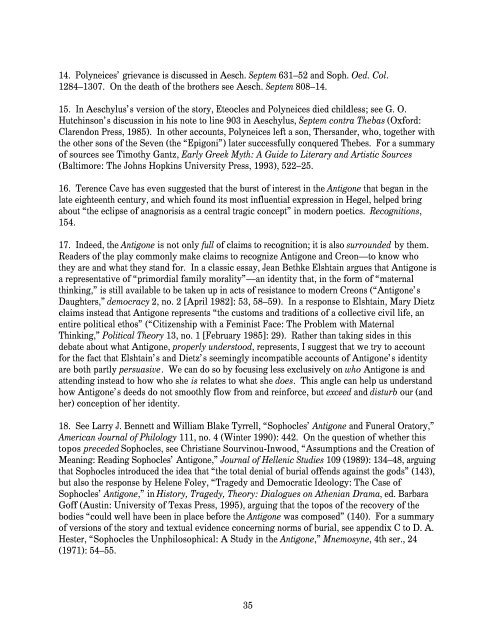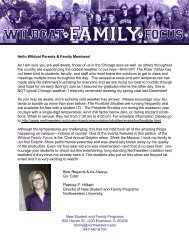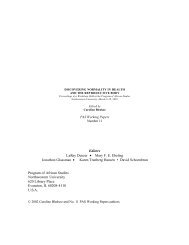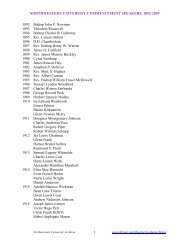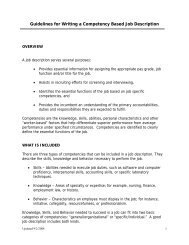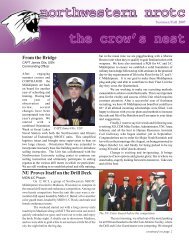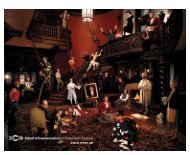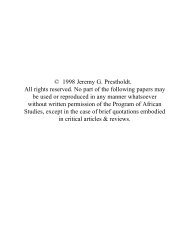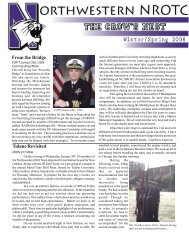TRAGIC RECOGNITION: ACTION AND IDENTITY IN ANTIGONE ...
TRAGIC RECOGNITION: ACTION AND IDENTITY IN ANTIGONE ...
TRAGIC RECOGNITION: ACTION AND IDENTITY IN ANTIGONE ...
You also want an ePaper? Increase the reach of your titles
YUMPU automatically turns print PDFs into web optimized ePapers that Google loves.
14. Polyneices’ grievance is discussed in Aesch. Septem 631–52 and Soph. Oed. Col.<br />
1284–1307. On the death of the brothers see Aesch. Septem 808–14.<br />
15. In Aeschylus’s version of the story, Eteocles and Polyneices died childless; see G. O.<br />
Hutchinson’s discussion in his note to line 903 in Aeschylus, Septem contra Thebas (Oxford:<br />
Clarendon Press, 1985). In other accounts, Polyneices left a son, Thersander, who, together with<br />
the other sons of the Seven (the “Epigoni”) later successfully conquered Thebes. For a summary<br />
of sources see Timothy Gantz, Early Greek Myth: A Guide to Literary and Artistic Sources<br />
(Baltimore: The Johns Hopkins University Press, 1993), 522–25.<br />
16. Terence Cave has even suggested that the burst of interest in the Antigone that began in the<br />
late eighteenth century, and which found its most influential expression in Hegel, helped bring<br />
about “the eclipse of anagnorisis as a central tragic concept” in modern poetics. Recognitions,<br />
154.<br />
17. Indeed, the Antigone is not only full of claims to recognition; it is also surrounded by them.<br />
Readers of the play commonly make claims to recognize Antigone and Creon—to know who<br />
they are and what they stand for. In a classic essay, Jean Bethke Elshtain argues that Antigone is<br />
a representative of “primordial family morality”—an identity that, in the form of “maternal<br />
thinking,” is still available to be taken up in acts of resistance to modern Creons (“Antigone’s<br />
Daughters,” democracy 2, no. 2 [April 1982]: 53, 58–59). In a response to Elshtain, Mary Dietz<br />
claims instead that Antigone represents “the customs and traditions of a collective civil life, an<br />
entire political ethos” (“Citizenship with a Feminist Face: The Problem with Maternal<br />
Thinking,” Political Theory 13, no. 1 [February 1985]: 29). Rather than taking sides in this<br />
debate about what Antigone, properly understood, represents, I suggest that we try to account<br />
for the fact that Elshtain’s and Dietz’s seemingly incompatible accounts of Antigone’s identity<br />
are both partly persuasive. We can do so by focusing less exclusively on who Antigone is and<br />
attending instead to how who she is relates to what she does. This angle can help us understand<br />
how Antigone’s deeds do not smoothly flow from and reinforce, but exceed and disturb our (and<br />
her) conception of her identity.<br />
18. See Larry J. Bennett and William Blake Tyrrell, “Sophocles’ Antigone and Funeral Oratory,”<br />
American Journal of Philology 111, no. 4 (Winter 1990): 442. On the question of whether this<br />
topos preceded Sophocles, see Christiane Sourvinou-Inwood, “Assumptions and the Creation of<br />
Meaning: Reading Sophocles’ Antigone,” Journal of Hellenic Studies 109 (1989): 134–48, arguing<br />
that Sophocles introduced the idea that “the total denial of burial offends against the gods” (143),<br />
but also the response by Helene Foley, “Tragedy and Democratic Ideology: The Case of<br />
Sophocles’ Antigone,” in History, Tragedy, Theory: Dialogues on Athenian Drama, ed. Barbara<br />
Goff (Austin: University of Texas Press, 1995), arguing that the topos of the recovery of the<br />
bodies “could well have been in place before the Antigone was composed” (140). For a summary<br />
of versions of the story and textual evidence concerning norms of burial, see appendix C to D. A.<br />
Hester, “Sophocles the Unphilosophical: A Study in the Antigone,” Mnemosyne, 4th ser., 24<br />
(1971): 54–55.<br />
35


